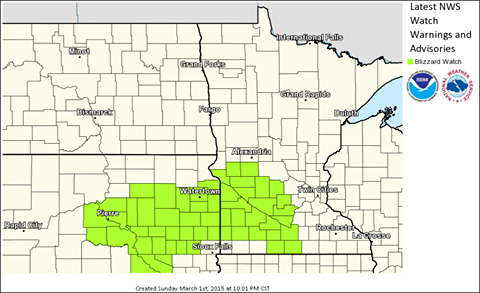![]()
By Kristin Vandersnick
HURON (KELO AM) - Farm and ranch members of the South Dakota Farm Bureau are expressing their thanks for their Congressional delegation’s work on permanently repealing the estate tax, a tax that is especially devastating to families trying to pass the farm or ranch down to the next generation.
Last week, U.S. Representative Kristi Noem (R-SD) helped pass H.R. 1105 – the Death Tax Repeal Act of 2015 – out of the House Ways and Means Committee, paving the way for a vote in the full House later this year. A similar bill authored by U.S. Senator Thune (R-SD) was also adopted last week by the Senate as an amendment to the Fiscal Year 2016 budget resolution.
“Facing an estate tax of up to forty percent when a family is trying to hand down the farm or ranch can be absolutely devastating to that next generation. It’s time to permanently repeal this unfair tax, and we appreciate the hard work of our Congressional delegation to get this job done as soon as possible,” said Scott VanderWal, SDFB President and third-generation family farmer from Volga, S.D.
The estate tax is hard on all family-owned businesses, but especially farms and ranches because agricultural assets – land, livestock, buildings, machinery – are not liquid. As is common with all small businesses, farms and ranches may have a lot of equity, but that does not necessarily translate to cash in the bank. Faced with a death tax of up to 40 percent, families may be forced to sell off assets to access enough cash to pay the tax – assets they need to keep the business operating. Another option is taking a large mortgage on the assets. Either way, it places a huge financial burden on the next generation.
Josh Geigle is a young rancher from Creighton, S.D. who can relate to concerns over what the future may hold if the estate tax stays in place. He and his wife, Shasta, are the fourth on his family’s ranch which was founded in 1907.
“Farming and ranching require extremely high capital investments that take an entire lifetime to pay off,” Josh Geigle commented. “My father and mother have worked their entire lives to keep our family farm and ranch viable so it can be passed down to the next generation. If we ever did face a death tax of this magnitude, we would have to sell half of our land and/or other assets to pay the tax. This would be a huge step backwards for any young family that is stepping up to be the next generation of their family’s farm or ranch.”
The South Dakota Farm Bureau represents more than 14,300 farm, ranch and rural families across the state.













.jpg)




